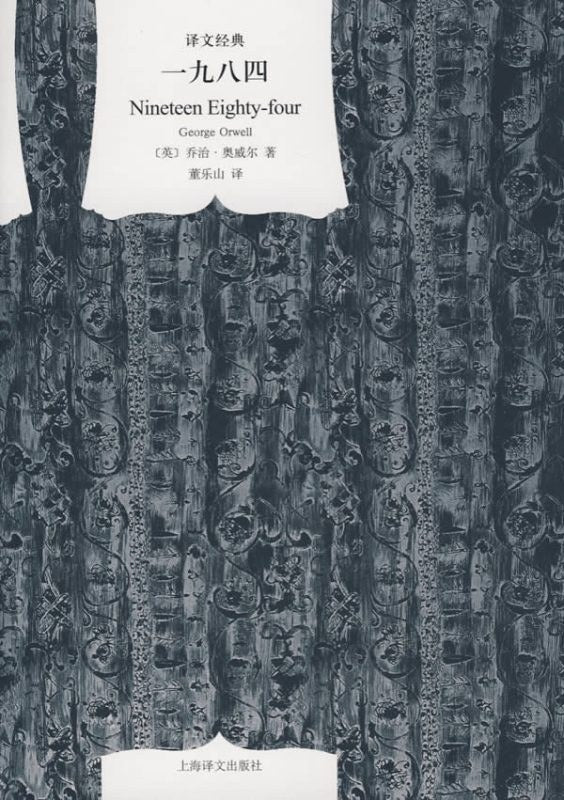WULOLIFE
《一九八四》作者: [英]乔治·奥威尔出版社: 上海译文出版社
《一九八四》作者: [英]乔治·奥威尔出版社: 上海译文出版社
Couldn't load pickup availability
Description
内容简介 · · · · · ·
《一九八四》(1949)是奥威尔的传世之作,堪称世界文坛最著名的反乌托邦、反极权的政治讽喻小说。他在小说中创造的“老大哥”、“双重思想”、“新话”等词汇都已收入权威的英语词典,甚至由他的姓衍生出“奥威尔式”(Orwellian)、“奥威尔主义”(Orwelli sm)这样的通用词汇,不断出现在报道国际新闻的记者笔下,足见其作品在英语国家影响之深远。
“多一个人看奥威尔,就多了一份自由的保障,”
作者简介 · · · · · ·
乔治·奥威尔(George Orwell)是英国人,本名埃里克·亚瑟·布莱尔(Eric Arthur Blair)。1903Chinese:或没有钱财的中产家庭”。
1904年,由母亲带他先回到了英国。他自幼天资聪颖,11岁时就在报纸上发表Eton他就饱尝了被富家子弟歧视的苦涩,从他后来的回顾中可以看出,凭他那天生就很敏感的心灵,这时已经对不平等有了初步的体验。
1921:被奴役的殖民地人民的悲惨生活无时不在刺激着他的良知。看着他们在饥寒交迫中、他深深感到“帝国主义是一种暴虐”。身为一名帝国警A Hanging, 1931, Burmese Days, 1934, 1934, Hanging, 1931 Elephant (1936)
但是,这一段生活经历仍使布莱尔内疚不已。为了自我教育,他从1928年1月回国时起,就深入到社会最底层,四处漂泊流落。尽管他自幼就体弱多病,但在巴黎、伦敦两地,他当过洗盘子的杂工,住过贫民窟,并常常混迹在流浪汉和Down and Out in Paris and London,1933 ,布莱尔用了“乔治·奥威尔”这一笔名。某种程度上说,“奥威尔”的出现,开始了布莱尔的新生活。
这时的奥威尔已经把自己深切的情感系于无产阶级的命运上,在思想上也开始倾向社会主义。他不能容忍劳苦大众在英国处于一种“被忽视的”地位,他曾这样深情地写道:“他们才是真正的英国人。”赶巧,在1936年,有一位进步出版商聘请一位属于“不是受害者自己,而是见证人”的作家,去北部工业区(兰开郡,约克郡)对工人的穷困状况作实地调查。被认为是最合适的人选的奥威尔欣然应聘,历时数月,通过自己的并参考了包括恩格斯《通往威根码头之路》(The Road to Wigan Pier,1937年)--New Year暗。奥威尔不但据此愤怒地谴责资本主义工业化对人性的摧残,还主张用社会主义来拯治社会的弊端。
1936年7月,西班牙内战爆发。同年年底,奥威尔与新婚的妻子一同奔赴西班牙,投身于保卫共和政府的光荣战斗。奥威尔在前线担任少尉,喉部曾经受过重伤。他为记述西班牙内战而写的《向卡特洛尼亚致敬》(Homage to Catalonia, 1938
但是,这场正义的战争,由于左翼共和政府内部分裂,最后竟失败了。没有死于法西斯枪弹下的奥威尔,竟差一点丧身在共和政府内部党派之争的倾轧中。这个惨痛的经验对奥威尔影响巨大。他曾说自己“从1930年起就是一个社会主义者了”,而这时候,他又开始考虑“捍卫民主社会主义”的问题Nineteen Eighty-Four, 1949)创作。
他为后人留下了大量的作品,仅以《动物庄园》和《1984》而言,他的影响已经不可估量。以至于为了指代某些奥威尔所描述过的社会现象,现代英语中还专门有一个词叫“奥威尔现象(Gold wellian)”。是反映“贫困”和“政治”这两个主题,那么激发他这样写作的主要动力就是良知和真诚。1950年1月,奥威尔病逝,享年46岁。
